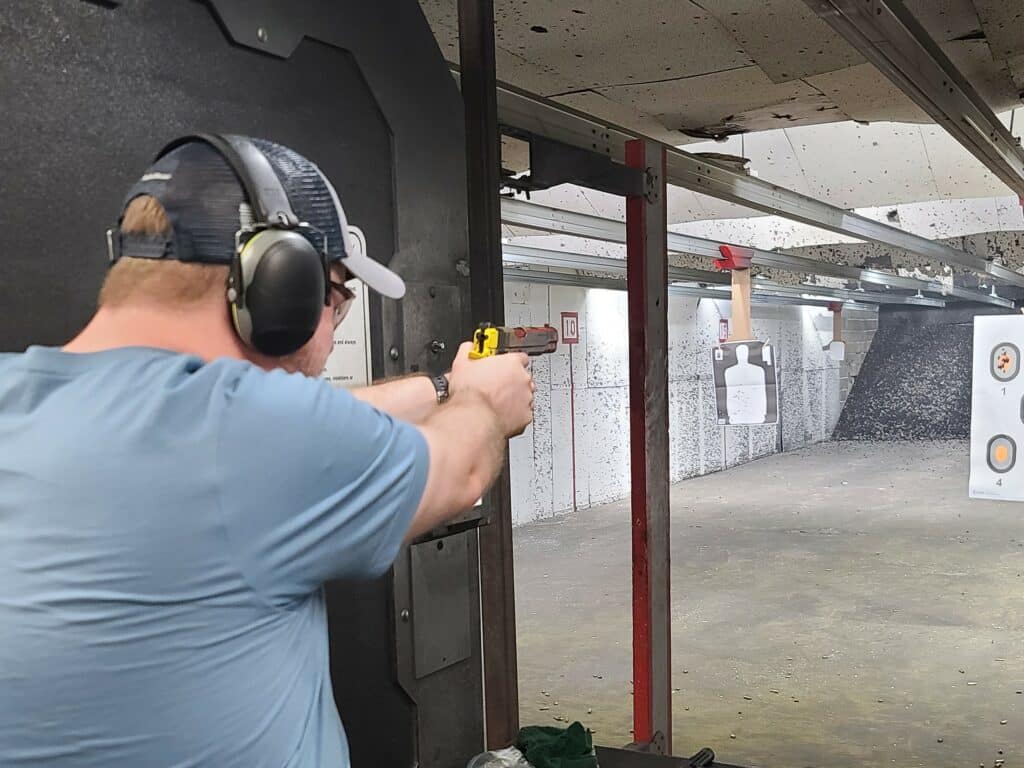We have a hunter-heavy newsletter this week.
While New Mexico’s Democratic governor is setting up a new Second Amendment showdown by using emergency powers to suspend gun-carry in several cities for 30 days (two lawsuits have already been filed and we’ll have more on that soon), the president’s son appears to be setting up his own. The Special Counsel overseeing Hunter Biden’s case just announced he plans to file gun charges this month. Hunter’s lawyers have said they plan to use a Second Amendment defense if those charges ever make it to trial.
Contributing Writer Jake Fogleman took a close look at whether the president’s son has a shot at winning if the case does go in that direction.
His won Hunter is not the only one causing problems for Joe Biden. America’s hunters have become a major issue for him too because the Department of Education has cut off hunter safety funding for schools. I explain what the bipartisan uproar tells us about the politics of the moment.
Plus, The Atlantic’s Andrew Exum joins the podcast to discuss just how important hunting is to America. And I give an update on the modification I made to my 1911.

Analysis: Evaluating a Potential Hunter Biden Second Amendment Defense [Member Exclusive]
By Jake Fogleman
There’s now a genuine possibility the President’s son could be one of the country’s next big Second Amendment plaintiffs. Moreover, he stands a solid chance of winning.
Earlier this week, Special Counsel David Weiss announced that his office intends to seek a federal indictment against Hunter Biden before the end of the month. The filing, spurred by the collapse of a plea deal with the Department of Justice last month, specifically aims to charge Biden for violations of federal firearms law relating to his acquisition and possession of a handgun at a time he admitted he was addicted to crack cocaine.
“The Speedy Trial Act requires that the Government obtain the return of an indictment by a grand jury by Friday, September 29, 2023, at the earliest. The Government intends to seek the return of an indictment in this case before that date,” the filing reads.
Depending on the specific nature of the eventual charge(s), it seems likely that the junior Biden will face potential prison time for violating a statute for which his father recently increased criminal penalties. Adding to the intrigue, his lawyers have already pledged to challenge any federal gun charge Hunter might face under the Second Amendment.
Should that happen, Biden stands a distinct possibility of not only succeeding—avoiding a felony conviction and possible jail time—but also adding to a growing body of Second Amendment jurisprudence whittling away at federal firearms prohibitions.
Ever since the Supreme Court handed down its decision in New York State Rifle and Pistol Association v. Bruen last June, courts across the country have been split over the constitutionality of prohibiting the purchase and possession of firearms by unlawful drug users.
At least two federal district courts and a federal appellate court have all ruled against the ban—primarily, though not exclusively, as it relates to marijuana. In each case, the judges reviewing the evidence determined that the nation’s historical tradition of gun regulation did not support a categorical ban on gun ownership for substance use–a key requirement of the test laid out in Bruen.
“In short, our history and tradition may support some limits on an intoxicated person’s right to carry a weapon, but it does not justify disarming a sober citizen based exclusively on his past drug usage,” Fifth Circuit Judge Jerry E. Smith, a Ronald Reagan appointee, wrote for a unanimous panel in U.S. v. Daniels. “Nor do more generalized traditions of disarming dangerous persons support this restriction on nonviolent drug users.”
In each case, the federal government cited colonial-era laws in places like Virginia and New York that prohibited publicly carrying and discharging firearms while intoxicated or during New Year’s celebrations. Each judge found those comparisons inadequate because, unlike those historical examples, current federal law covers anyone who has habitually used an unlawful controlled substance.
“The Virginia law prevented individuals from using firearms while actively intoxicated, while § 922(g)(3) prevents users of intoxicants from possessing firearms altogether,” U.S. District Judge Kathleen Cardone, a George W. Bush appointee, wrote in U.S. v. Connelly.
The latter, she said, would be like if modern DUI laws were changed to “prevent individuals from possessing cars at all if they regularly drink alcohol on weekends.”
The judges also bristled at the notion that drug users fell into a broader category of “dangerous” or “unvirtuous” people such as felons, rebels, the mentally ill, and disfavored minority groups that faced many Founding and Reconstruction-era restrictions on firearms rights and other liberties.
“At argument, the United States pointed to a variety of rather ignominious historical restrictions that it argues demonstrates a historical tradition permitting legislatures to disarm those whom the legislature views as ‘untrustworthy’: namely, slaves, Indians, Catholics, and loyalists,” U.S. District Judge Patrick Wyrick, a Trump appointee, wrote in U.S. v. Harrison. “Since Congress could equally view drug users as ‘untrustworthy,’ so the argument goes, then these historical regulations provide constitutional cover for § 922(g)(3). The United States’ reliance on these laws is concerning, but in any event, they do not support the constitutionality of § 922(g)(3).”
Importantly, however, not every judge has viewed the issue the same way. At least two federal district judges, including one as recently as last month, have ruled to uphold the federal gun prohibition for drug users as constitutional.
U.S. District Judge Alan Albright, a Donald Trump appointee, ruled last December that unlawful drug users were not even covered by the plain text of the Second Amendment because they are not “law-abiding.”
“The decision in Bruen provides clear insight into the meaning of ‘the people’ which the Second Amendment protects. As one Circuit Court has noted, the majority in Bruen consistently explains that the holders of Second Amendment rights are ‘law-abiding’ citizens,” Judge Albright wrote in U.S. v. Sanchez.
Another federal judge, C.J. Williams in the Northern District of Iowa, disagreed with that analysis but still came to the conclusion that the federal gun ban was lawful based on a historical tradition of withholding rights from citizens based on criminality.
“The Court finds that Section 922(g)(3) does not violate the Second Amendment on its face and therefore denies defendant’s motion to dismiss,” Williams, another Trump appointee, wrote last month in U.S. v. Grubb. “In arriving at this conclusion, the Court first finds that Section 922(g)(3) implicates conduct protected by the Second Amendment. Second, the Court concludes that Section 922(g)(3) is consistent with this Nation’s traditional regulation of possession of firearms by criminals.”
Judge Williams took direct aim at the historical analysis of other federal courts who ruled to strike down the law, particularly on the subject of “dangerousness,” stating that he found those decisions to be incorrectly narrow in their view of history.
“The Court has reviewed these non-binding decisions and, with respect, simply disagrees with the narrow view these courts took of the historic precedent of regulating firearm possession by dangerous and unlawful citizenry,” he wrote. “The Court is persuaded that Section 922(g)(3) is a constitutional restriction consistent with historical tradition.”
Given that the federal judiciary has been so split on the issue, an eventual Hunter Biden Second Amendment challenge to his imminent criminal charges won’t be a slam dunk either way. Still, rulings against the statute since Bruen currently outnumber the ones in favor. Furthermore, the ruling in Sanchez cited heavily to pre-Bruen cases in support of its decision, as well as to the district court ruling that was explicitly overturned by the Fifth Circuit in Daniels.
That bodes well for Hunter Biden and his legal team should it come to a constitutional claim. Ultimately, though, his fate may be determined, like so much else in the current Second Amendment legal landscape, by what the Supreme Court says on the matter.
Podcast: The Atlantic’s Andrew Exum in Defense of Hunting [Member Early Access]
By Stephen Gutowski
This week, we’re talking about the importance of hunting.
In a bit of a surprise move, The Atlantic published a superb article explaining why America needs hunting more than many might imagine. So, I thought it would be a good idea to have the author of the piece on. That’s why Andrew Exum is joining the show.
He describes the role that hunting plays in conserving American wildlife. He notes that it’s not just important for wildlife population control either. Taxes on guns, ammunition, and hunting license fees are also a primary contributor to conservation funding.
Andrew describes his background as a veteran and former Department of Defense official from the South who now lives in Washington, D.C. but still hunts regularly. We also discuss why he views guns like the AR-15 very differently from hunting rifles, and he responds to some common critiques of that worldview.
He then describes his view that hunting is also an important component of sustainable living. And he gave me some advice as me and my girlfriend prepare to take our first hunter safety course later this month.
Plus, Contributing Writer Jake Fogleman and I talk about Boston doubling down on delaying gun-carry permits.
You can listen to the show on your favorite podcasting app or by clicking here. You can watch the episode on our YouTube channel. Reload Members get access on Sunday, as always. Everyone else can listen on Monday.
Testing My Handiwork
I was finally able to get out to the range to try my 1911 after replacing the slide catch and shaving down the sharp edge of the thumb safety. The bad news is the new slide catch didn’t solve my problem. The gun did not lock back on the empty chamber.
I’m thinking it may be a magazine problem. Although, none of the three I have locked open. Let me know if you have any advice!
The good news is the thumb safety no longer digs into the webbing of my hand! That makes me very happy. It’s much more pleasant to shoot now, which is great because it was already my favorite gun!

Analysis: The Politics of the Hunter Safety Funding Mess [Member Exclusive]
By Stephen Gutowski
Last year, the Bipartisan Safer Communities Act showed where there was agreement among the parties over gun policy. This year, backlash to part of its implementation is doing the same thing.
On Tuesday, a group of senators shot off a pair of letters in hopes of reviving funding for hunter safety training programs at schools across the country. It is the only gun policy effort to see significant support from both sides of the aisle. All said, 21 senators who backed the BSCA joined in the effort to undo its effect on hunting programs–including the two who negotiated the bill. A dozen of them are Democrats.
Many involved either play a prominent role on firearms policy for their respective parties, such as John Cornyn (R., Texas) and Chris Murphy (D., Conn.), or they represent key swing states. The entire Pennsylvania, West Virginia, and Arizona delegations were on board. As were Senators from New Hampshire, Wisconsin, Minnesota, and North Carolina.
That level of cooperation on any gun policy provides a strong signal of the political calculations at play. Here, that signal is clear: the federally funded school programs providing hunter safety and archery training enjoyed by millions of students nationwide are quite popular. Cutting off their funding is not.
The ordeal began in April when the Department of Education (DOE) published a guide to the funding changes made by the BSCA. In it, the agency said new language amending the Elementary and Secondary Education Act (ESEA) made it impossible to fund any program that provides “to any person a dangerous weapon or training in the use of a dangerous weapon.” Under federal law, dangerous weapons are basically anything that can be used to kill somebody (except, for whatever reason, pocket knives with blades shorter than two inches.)
The bipartisan group of senators argued the DOE was off in its reading of the language.
“The intent of section 13401 of BSCA was to preclude these funds from being used to purchase dangerous weapons or train individuals in the use of dangerous weapons, with the recognition that ESEA funds should support student achievement, educational enrichment programs, and student well-being,” they wrote in a letter to Senate Appropriations Committee leadership. “Other federal funds appropriated in BSCA were intended to support evidence-based school safety and protective measures.”
DOE has yet to respond to the letters. However, the language itself doesn’t make any such distinction. Instead, it simply reads that ESEA funds can’t be used “for the provision to any person of a dangerous weapon, as defined in section 930(g)(2) of title 18, or training in the use of a dangerous weapon.”
Regardless, the senators who backed the bill said the DOE has “misinterpreted” their intent with the provision. And they warn the consequences could be far-reaching–even hitting home ec classes.
“Additionally, the language could be used to prohibit schools from providing kitchen knives that are larger than 2 ½ inches long in culinary classes,” they wrote. “There are a number of such programs in our states and local communities that support student engagement and enrichment. The National Archery in Schools Program (“NASP”) is one example of a program that provides students from all backgrounds the opportunity to learn a new sport and compete. More than 1.3 million students across nearly 9,000 schools in 49 states participate in NASP’s archery programs. Additionally, many school districts and local partners, particularly in rural communities, use ESEA funds to support hunter education safety programs and classes. These courses can play an important role in teaching firearm safety, wildlife conservation, and personal responsibility. The intent of BSCA was not to preclude students from participating in these kinds of opportunities.”
They’ve asked the DOE to restore the funding. Barring that, they’ve also requested the Senate Appropriations Committee address the issue by amending an upcoming spending bill. Their proposal would add language that protects funds for programs “that provide students with educational enrichment activities and instruction, such as archery, hunter safety education, outdoor education, or culinary arts.”
Whatever happens, and it seems likely a fix will get done given the pressure, the most telling thing about the situation is how much crossover appeal it has.
There have been numerous gun policy pushes from either side of the aisle since the BSCA enshrined extended background checks for 18-to-20-year-old gun buyers, added boyfriends to the domestic violence misdemeanor prohibition, and expanded funding for state mental health programs back in June 2022. Democrats got a so-called assault weapons ban through the House last year with practically no buy-in from the other party. It never got a vote in the Senate due to the total lack of bipartisan support. Republicans recently experienced a similar fate while attempting to undo President Joe Biden’s pistol-brace ban. It made it through the House on party lines and then failed in the Senate without a single Democrat or Independent voting for it.
Ironically, the only gun policy effort to see any semblance of bipartisan backing is the one to undo an unintended consequence of the last bipartisan push.
That’s it for now.
I’ll talk to you all again soon.
Thanks,
Stephen Gutowski
Founder
The Reload







